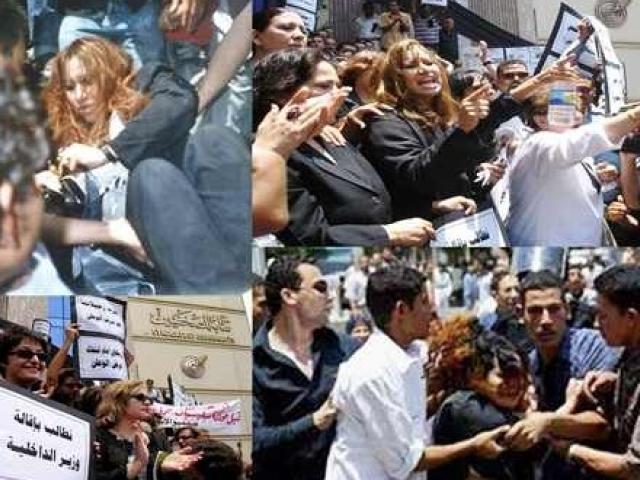
Three years of willful disregard: Egyptian government refuses to implement ruling of African Commission ordering renewed investigation of Black Wednesday case. Survivors of mass sexual assaults have no recourse to remedie
Press Release
The anniversary of Black Wednesday, when in May 2005 several female demonstrators and journalists were sexually assaulted by demonstrators in support of former Egyptian President Hosni Mubarak, comes this year as freedom of opinion, expression, and peaceful assembly have been seriously eroded. Only a few weeks ago, a similar scene was enacted when police forces stormed the Journalists Syndicate, in a wholly unprecedented move, and when during a general assembly meeting of the syndicate on May 4, 2016, individuals in civilian clothing standing with security forces attacked demonstrators and journalists.
In this context, the Egyptian Initiative for Personal Rights again reminds the Egyptian government of the ruling obtained by the EIPR and the International Center for the Legal Protection of Human Rights (Interights) on March 14, 2013 from the African Commission on Human and Peoples’ Rights. The decision requires Egypt to reopen the investigation into the incident and ensure accountability for the persons responsible for the sexual and physical assault of female journalists and demonstrators who were on the steps of the syndicate protesting constitutional amendments instituted by President Mubarak. The ruling also requires the Egyptian government to pay compensation of LE57,000 to each of the four complainants, all journalists, on whose behalf the EIPR filed the suit: Shaimaa Abu al-Khair, Abir al-Askari, Nawal Ali (d. 2009), and Iman Taha.
The African Commission gave the Egyptian government six months (180 days) from the time of its notification of the ruling to submit a report to the commission detailing the steps it would take towards implementation. Although the EIPR alerted the Foreign Ministry of the importance of implementing the ruling, the Egyptian government continues to ignore it, offering no clear reasons for this disregard.
After the ruling was issued, the EIPR initiated contact with the Foreign Ministry and the Ministry of International Cooperation to discuss the mechanisms and deadline for implementation, but all correspondence, and the six-month deadline, were ignored. The EIPR then contacted to African Commission regarding non-implementation, after which the Egyptian government submitted a response in October 2013. Pursuant to this response, the EIPR sent a letter clarifying its points of disagreement with the government response. In its response, the Egyptian government said that its failure to implement the ruling was largely due to the issue of compensation. Citing lack of new evidence, it also refused to officially reopen the investigation, which had been closed. The African Commission considered both responses in December 2013.
The EIPR reiterates the importance of the government offering compensation for the victims of the assaults. This would establish an important rule for reparations for victims of sexual assaults, which increased markedly after January 2011, with repeated cases of mass sexual assault both by ordinary citizens and security forces. With the exception of a very few convictions in the rare cases in which the perpetrators were identified, women victims of mass sexual assaults have no clear recourse to justice or measures to guarantee them legal remedy and compensation for the harm they sustained. International law affirms the right of survivors of sexual assault to redress, including the right of restitution, compensation, rehabilitation, and guarantees of non-repetition. International legal literature also affirms that victims’ compensation must be proportional to the gravity of the crime committed against them.
The EIPR condemns the Egyptian government’s failure to implement the ruling, which is a clear breach of Egypt’s international and regional obligations to protect and uphold human rights and constitutes flagrant disregard for the constitution, which in Article 11 affirms the state’s obligation to protect women from all forms of violence.
The EIPR also notes that the government cannot be serious about combating sexual violence against women without an admission and true accounting of the role of security personnel in sponsoring or committing crimes of sexual violence against individuals and without ending the impunity they currently enjoy. We appeal to the National Council for Women to urge the government to take action to implement the ruling in line with the principles underlying the national strategy to combat violence against women.
The read the government’s response, click here.



